Carbon Prices, Fuel Prices, and Industry Competitiveness Report
VerifiedAdded on 2023/01/13
|7
|1328
|58
Report
AI Summary
This report provides a literature review analyzing the impact of carbon and fuel prices on industry competitiveness. It begins by defining carbon pricing and its role in addressing climate change by accounting for greenhouse gas emissions. The report explores the effects of carbon and fuel prices on various sectors, noting that while these prices aim to shift the market towards low-carbon solutions, evidence of their negative impact on economic performance is limited. Several factors influence investment and production decisions, and carbon pricing may not always be the determining variable. The report also discusses techniques for managing the adverse effects of these prices, such as market-based incentives, tax credits, and complementary policy measures. The conclusion highlights the importance of carbon pricing in mitigating climate change and suggests strategies to minimize negative impacts on industry competitiveness.
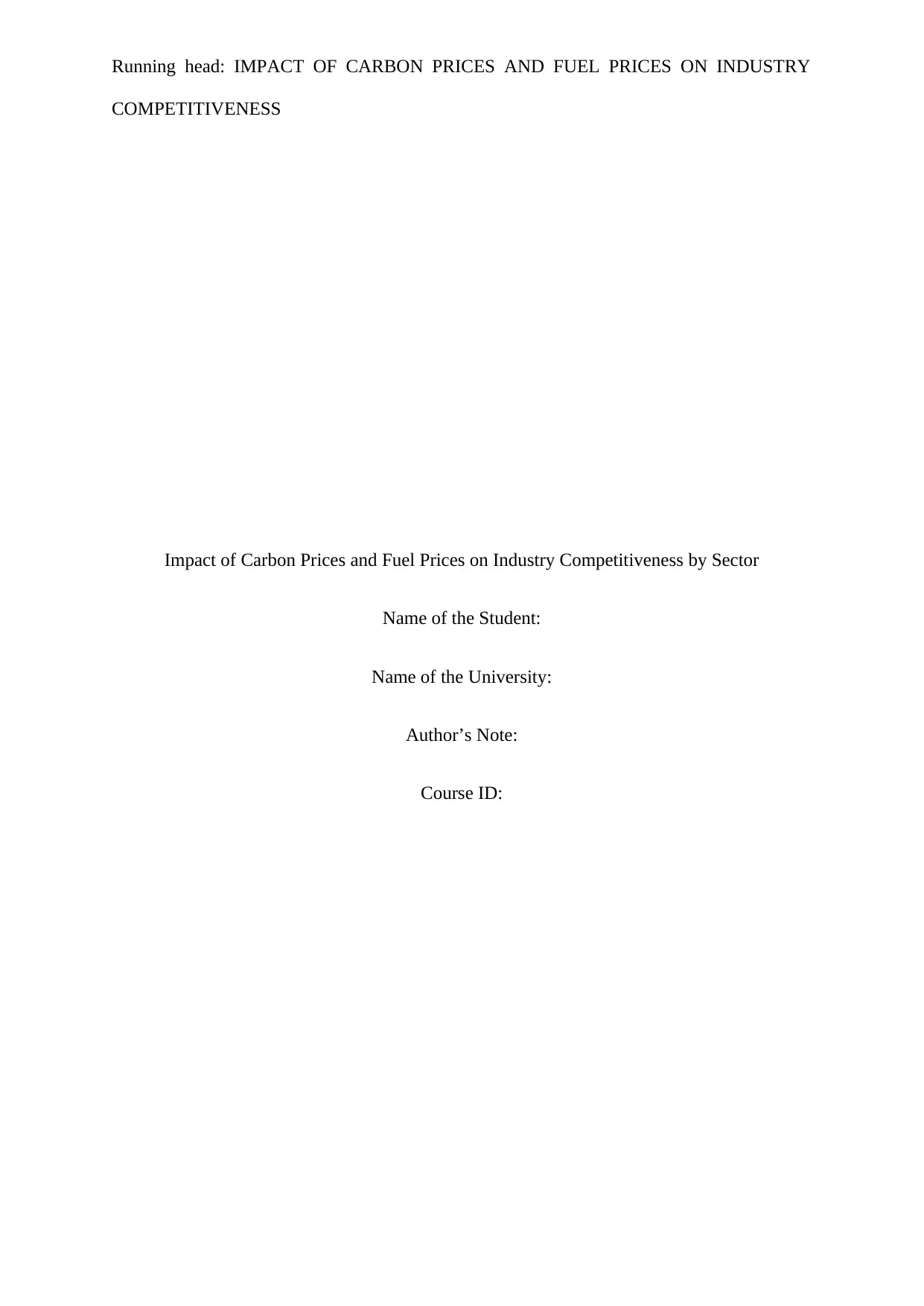
Running head: IMPACT OF CARBON PRICES AND FUEL PRICES ON INDUSTRY
COMPETITIVENESS
Impact of Carbon Prices and Fuel Prices on Industry Competitiveness by Sector
Name of the Student:
Name of the University:
Author’s Note:
Course ID:
COMPETITIVENESS
Impact of Carbon Prices and Fuel Prices on Industry Competitiveness by Sector
Name of the Student:
Name of the University:
Author’s Note:
Course ID:
Paraphrase This Document
Need a fresh take? Get an instant paraphrase of this document with our AI Paraphraser
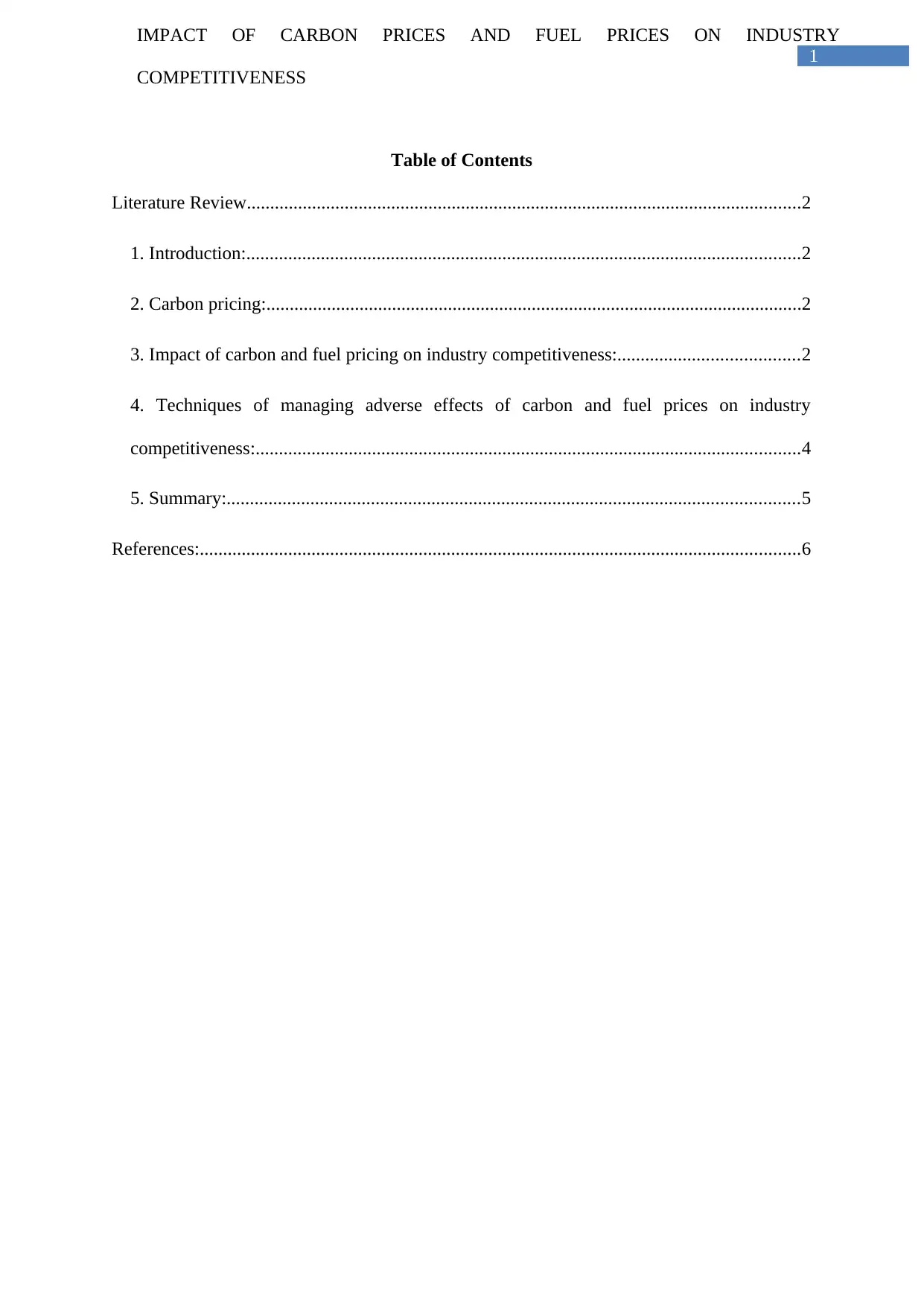
1
IMPACT OF CARBON PRICES AND FUEL PRICES ON INDUSTRY
COMPETITIVENESS
Table of Contents
Literature Review.......................................................................................................................2
1. Introduction:.......................................................................................................................2
2. Carbon pricing:...................................................................................................................2
3. Impact of carbon and fuel pricing on industry competitiveness:.......................................2
4. Techniques of managing adverse effects of carbon and fuel prices on industry
competitiveness:.....................................................................................................................4
5. Summary:...........................................................................................................................5
References:.................................................................................................................................6
IMPACT OF CARBON PRICES AND FUEL PRICES ON INDUSTRY
COMPETITIVENESS
Table of Contents
Literature Review.......................................................................................................................2
1. Introduction:.......................................................................................................................2
2. Carbon pricing:...................................................................................................................2
3. Impact of carbon and fuel pricing on industry competitiveness:.......................................2
4. Techniques of managing adverse effects of carbon and fuel prices on industry
competitiveness:.....................................................................................................................4
5. Summary:...........................................................................................................................5
References:.................................................................................................................................6
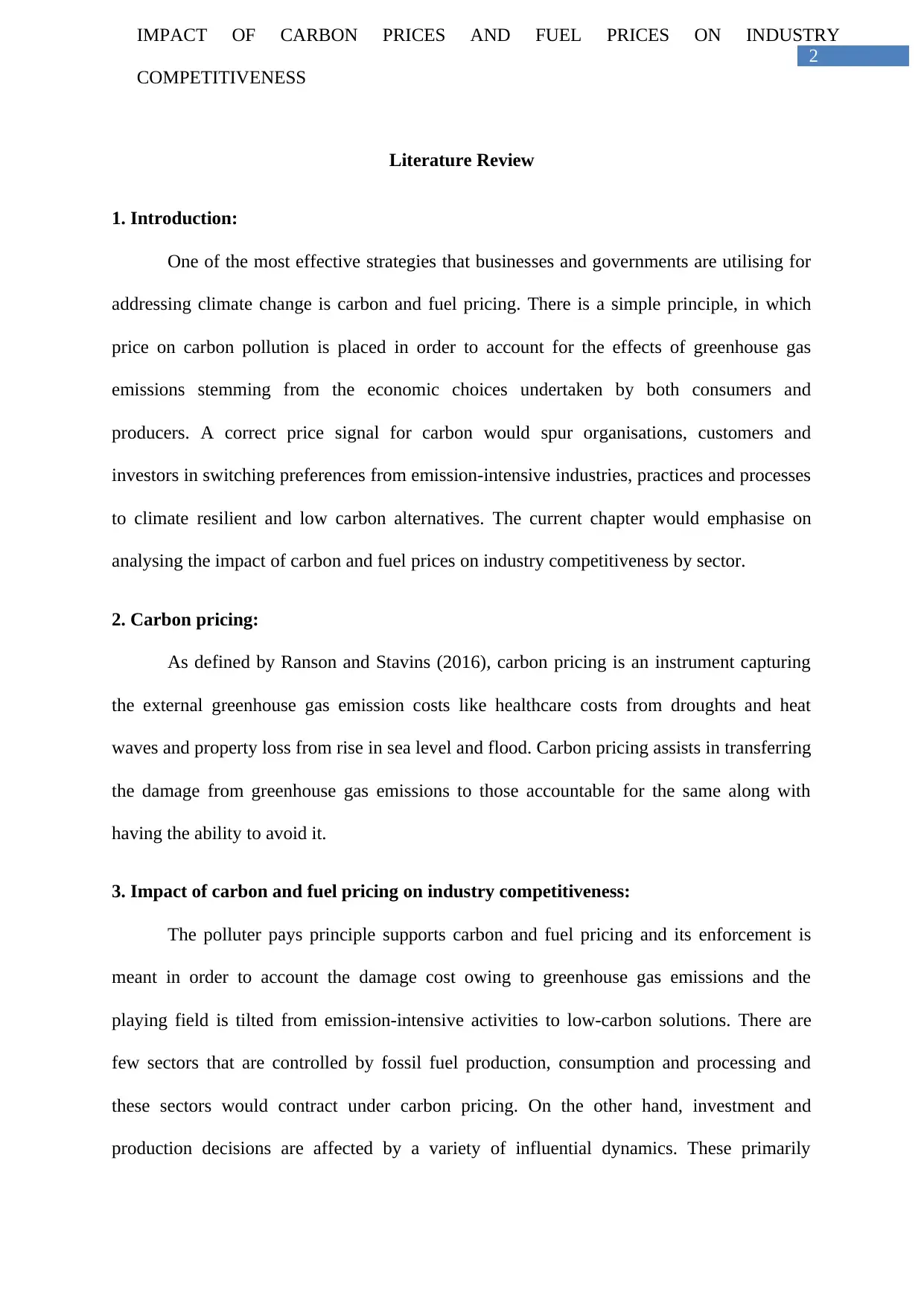
2
IMPACT OF CARBON PRICES AND FUEL PRICES ON INDUSTRY
COMPETITIVENESS
Literature Review
1. Introduction:
One of the most effective strategies that businesses and governments are utilising for
addressing climate change is carbon and fuel pricing. There is a simple principle, in which
price on carbon pollution is placed in order to account for the effects of greenhouse gas
emissions stemming from the economic choices undertaken by both consumers and
producers. A correct price signal for carbon would spur organisations, customers and
investors in switching preferences from emission-intensive industries, practices and processes
to climate resilient and low carbon alternatives. The current chapter would emphasise on
analysing the impact of carbon and fuel prices on industry competitiveness by sector.
2. Carbon pricing:
As defined by Ranson and Stavins (2016), carbon pricing is an instrument capturing
the external greenhouse gas emission costs like healthcare costs from droughts and heat
waves and property loss from rise in sea level and flood. Carbon pricing assists in transferring
the damage from greenhouse gas emissions to those accountable for the same along with
having the ability to avoid it.
3. Impact of carbon and fuel pricing on industry competitiveness:
The polluter pays principle supports carbon and fuel pricing and its enforcement is
meant in order to account the damage cost owing to greenhouse gas emissions and the
playing field is tilted from emission-intensive activities to low-carbon solutions. There are
few sectors that are controlled by fossil fuel production, consumption and processing and
these sectors would contract under carbon pricing. On the other hand, investment and
production decisions are affected by a variety of influential dynamics. These primarily
IMPACT OF CARBON PRICES AND FUEL PRICES ON INDUSTRY
COMPETITIVENESS
Literature Review
1. Introduction:
One of the most effective strategies that businesses and governments are utilising for
addressing climate change is carbon and fuel pricing. There is a simple principle, in which
price on carbon pollution is placed in order to account for the effects of greenhouse gas
emissions stemming from the economic choices undertaken by both consumers and
producers. A correct price signal for carbon would spur organisations, customers and
investors in switching preferences from emission-intensive industries, practices and processes
to climate resilient and low carbon alternatives. The current chapter would emphasise on
analysing the impact of carbon and fuel prices on industry competitiveness by sector.
2. Carbon pricing:
As defined by Ranson and Stavins (2016), carbon pricing is an instrument capturing
the external greenhouse gas emission costs like healthcare costs from droughts and heat
waves and property loss from rise in sea level and flood. Carbon pricing assists in transferring
the damage from greenhouse gas emissions to those accountable for the same along with
having the ability to avoid it.
3. Impact of carbon and fuel pricing on industry competitiveness:
The polluter pays principle supports carbon and fuel pricing and its enforcement is
meant in order to account the damage cost owing to greenhouse gas emissions and the
playing field is tilted from emission-intensive activities to low-carbon solutions. There are
few sectors that are controlled by fossil fuel production, consumption and processing and
these sectors would contract under carbon pricing. On the other hand, investment and
production decisions are affected by a variety of influential dynamics. These primarily
⊘ This is a preview!⊘
Do you want full access?
Subscribe today to unlock all pages.

Trusted by 1+ million students worldwide
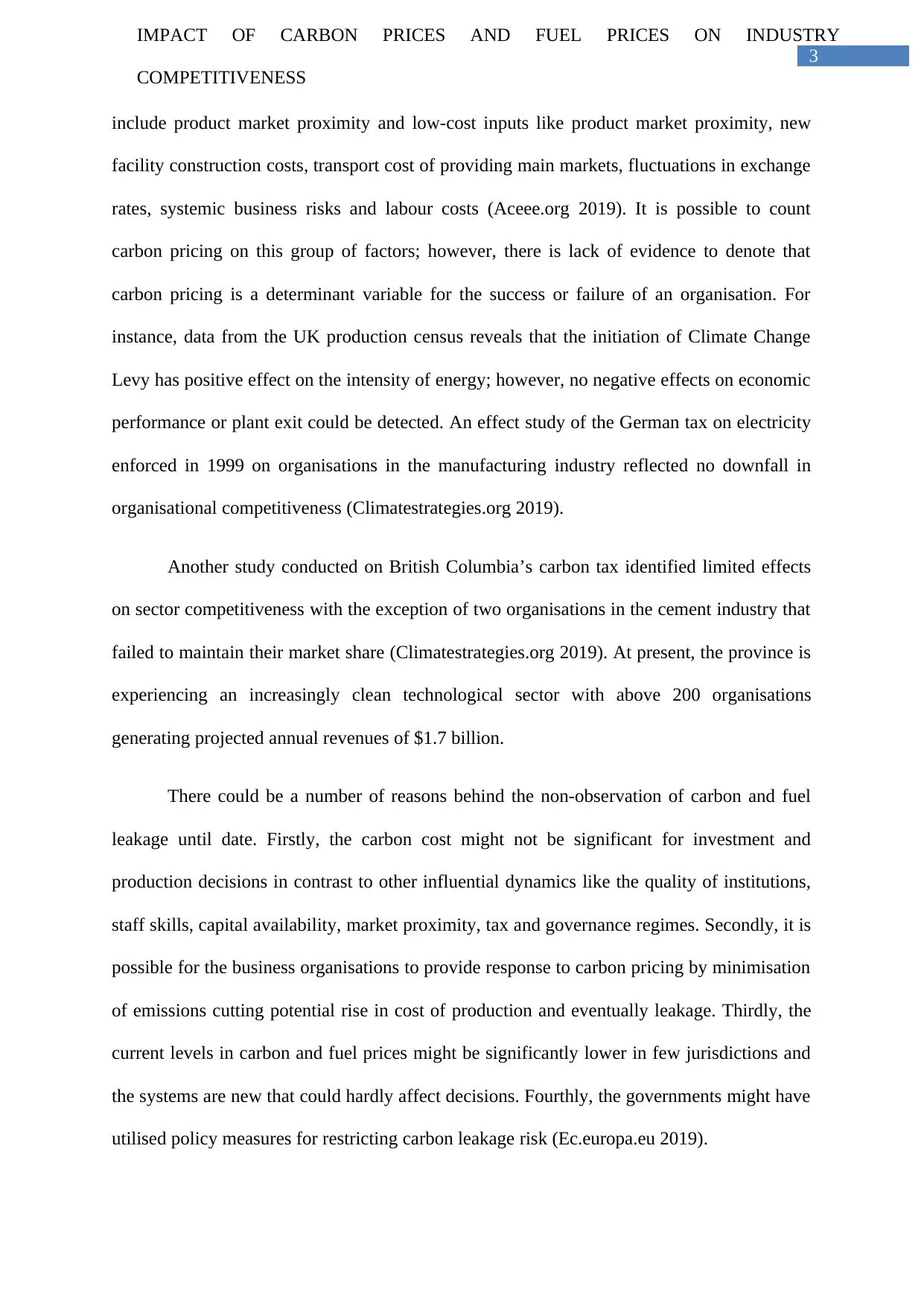
3
IMPACT OF CARBON PRICES AND FUEL PRICES ON INDUSTRY
COMPETITIVENESS
include product market proximity and low-cost inputs like product market proximity, new
facility construction costs, transport cost of providing main markets, fluctuations in exchange
rates, systemic business risks and labour costs (Aceee.org 2019). It is possible to count
carbon pricing on this group of factors; however, there is lack of evidence to denote that
carbon pricing is a determinant variable for the success or failure of an organisation. For
instance, data from the UK production census reveals that the initiation of Climate Change
Levy has positive effect on the intensity of energy; however, no negative effects on economic
performance or plant exit could be detected. An effect study of the German tax on electricity
enforced in 1999 on organisations in the manufacturing industry reflected no downfall in
organisational competitiveness (Climatestrategies.org 2019).
Another study conducted on British Columbia’s carbon tax identified limited effects
on sector competitiveness with the exception of two organisations in the cement industry that
failed to maintain their market share (Climatestrategies.org 2019). At present, the province is
experiencing an increasingly clean technological sector with above 200 organisations
generating projected annual revenues of $1.7 billion.
There could be a number of reasons behind the non-observation of carbon and fuel
leakage until date. Firstly, the carbon cost might not be significant for investment and
production decisions in contrast to other influential dynamics like the quality of institutions,
staff skills, capital availability, market proximity, tax and governance regimes. Secondly, it is
possible for the business organisations to provide response to carbon pricing by minimisation
of emissions cutting potential rise in cost of production and eventually leakage. Thirdly, the
current levels in carbon and fuel prices might be significantly lower in few jurisdictions and
the systems are new that could hardly affect decisions. Fourthly, the governments might have
utilised policy measures for restricting carbon leakage risk (Ec.europa.eu 2019).
IMPACT OF CARBON PRICES AND FUEL PRICES ON INDUSTRY
COMPETITIVENESS
include product market proximity and low-cost inputs like product market proximity, new
facility construction costs, transport cost of providing main markets, fluctuations in exchange
rates, systemic business risks and labour costs (Aceee.org 2019). It is possible to count
carbon pricing on this group of factors; however, there is lack of evidence to denote that
carbon pricing is a determinant variable for the success or failure of an organisation. For
instance, data from the UK production census reveals that the initiation of Climate Change
Levy has positive effect on the intensity of energy; however, no negative effects on economic
performance or plant exit could be detected. An effect study of the German tax on electricity
enforced in 1999 on organisations in the manufacturing industry reflected no downfall in
organisational competitiveness (Climatestrategies.org 2019).
Another study conducted on British Columbia’s carbon tax identified limited effects
on sector competitiveness with the exception of two organisations in the cement industry that
failed to maintain their market share (Climatestrategies.org 2019). At present, the province is
experiencing an increasingly clean technological sector with above 200 organisations
generating projected annual revenues of $1.7 billion.
There could be a number of reasons behind the non-observation of carbon and fuel
leakage until date. Firstly, the carbon cost might not be significant for investment and
production decisions in contrast to other influential dynamics like the quality of institutions,
staff skills, capital availability, market proximity, tax and governance regimes. Secondly, it is
possible for the business organisations to provide response to carbon pricing by minimisation
of emissions cutting potential rise in cost of production and eventually leakage. Thirdly, the
current levels in carbon and fuel prices might be significantly lower in few jurisdictions and
the systems are new that could hardly affect decisions. Fourthly, the governments might have
utilised policy measures for restricting carbon leakage risk (Ec.europa.eu 2019).
Paraphrase This Document
Need a fresh take? Get an instant paraphrase of this document with our AI Paraphraser
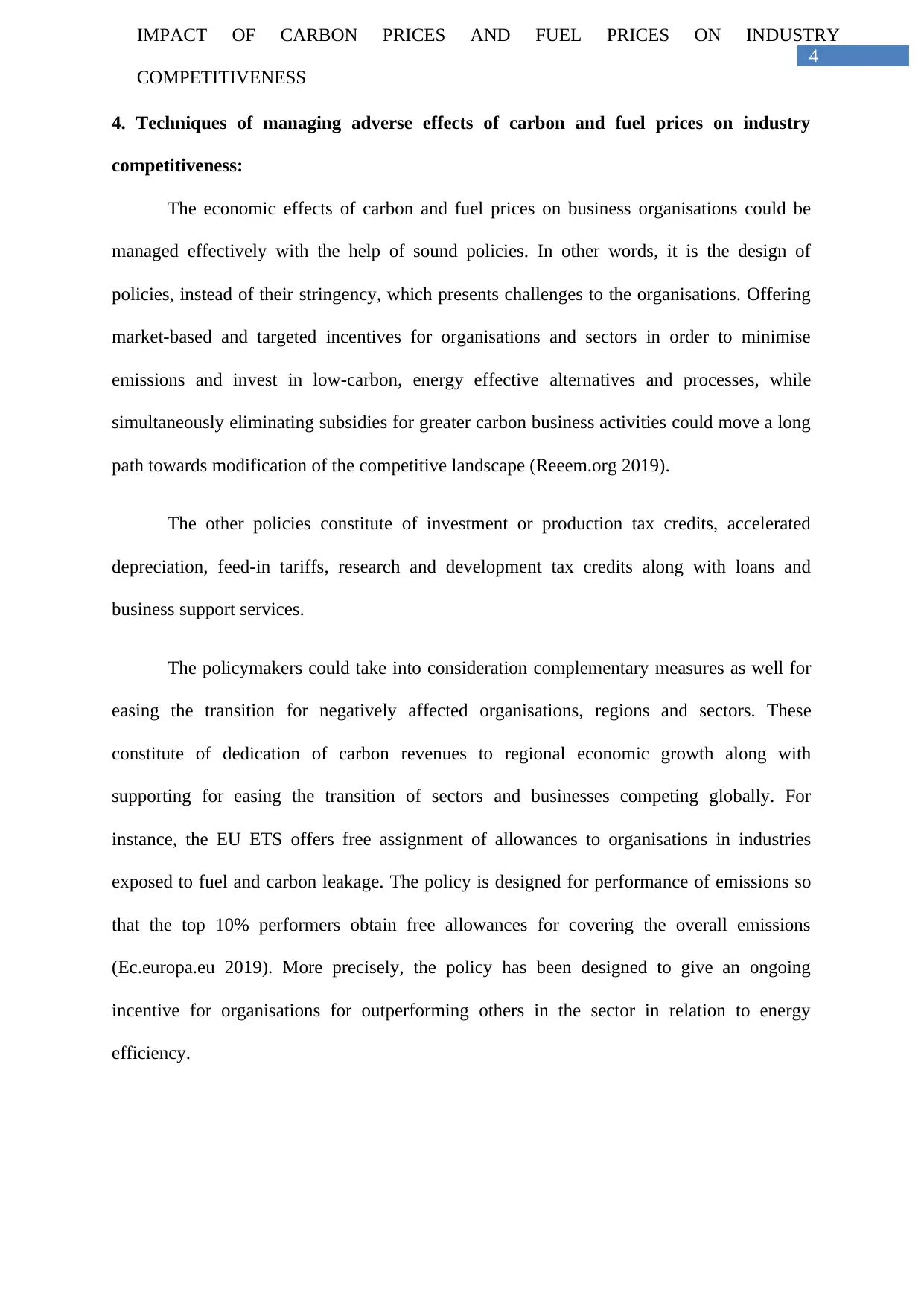
4
IMPACT OF CARBON PRICES AND FUEL PRICES ON INDUSTRY
COMPETITIVENESS
4. Techniques of managing adverse effects of carbon and fuel prices on industry
competitiveness:
The economic effects of carbon and fuel prices on business organisations could be
managed effectively with the help of sound policies. In other words, it is the design of
policies, instead of their stringency, which presents challenges to the organisations. Offering
market-based and targeted incentives for organisations and sectors in order to minimise
emissions and invest in low-carbon, energy effective alternatives and processes, while
simultaneously eliminating subsidies for greater carbon business activities could move a long
path towards modification of the competitive landscape (Reeem.org 2019).
The other policies constitute of investment or production tax credits, accelerated
depreciation, feed-in tariffs, research and development tax credits along with loans and
business support services.
The policymakers could take into consideration complementary measures as well for
easing the transition for negatively affected organisations, regions and sectors. These
constitute of dedication of carbon revenues to regional economic growth along with
supporting for easing the transition of sectors and businesses competing globally. For
instance, the EU ETS offers free assignment of allowances to organisations in industries
exposed to fuel and carbon leakage. The policy is designed for performance of emissions so
that the top 10% performers obtain free allowances for covering the overall emissions
(Ec.europa.eu 2019). More precisely, the policy has been designed to give an ongoing
incentive for organisations for outperforming others in the sector in relation to energy
efficiency.
IMPACT OF CARBON PRICES AND FUEL PRICES ON INDUSTRY
COMPETITIVENESS
4. Techniques of managing adverse effects of carbon and fuel prices on industry
competitiveness:
The economic effects of carbon and fuel prices on business organisations could be
managed effectively with the help of sound policies. In other words, it is the design of
policies, instead of their stringency, which presents challenges to the organisations. Offering
market-based and targeted incentives for organisations and sectors in order to minimise
emissions and invest in low-carbon, energy effective alternatives and processes, while
simultaneously eliminating subsidies for greater carbon business activities could move a long
path towards modification of the competitive landscape (Reeem.org 2019).
The other policies constitute of investment or production tax credits, accelerated
depreciation, feed-in tariffs, research and development tax credits along with loans and
business support services.
The policymakers could take into consideration complementary measures as well for
easing the transition for negatively affected organisations, regions and sectors. These
constitute of dedication of carbon revenues to regional economic growth along with
supporting for easing the transition of sectors and businesses competing globally. For
instance, the EU ETS offers free assignment of allowances to organisations in industries
exposed to fuel and carbon leakage. The policy is designed for performance of emissions so
that the top 10% performers obtain free allowances for covering the overall emissions
(Ec.europa.eu 2019). More precisely, the policy has been designed to give an ongoing
incentive for organisations for outperforming others in the sector in relation to energy
efficiency.
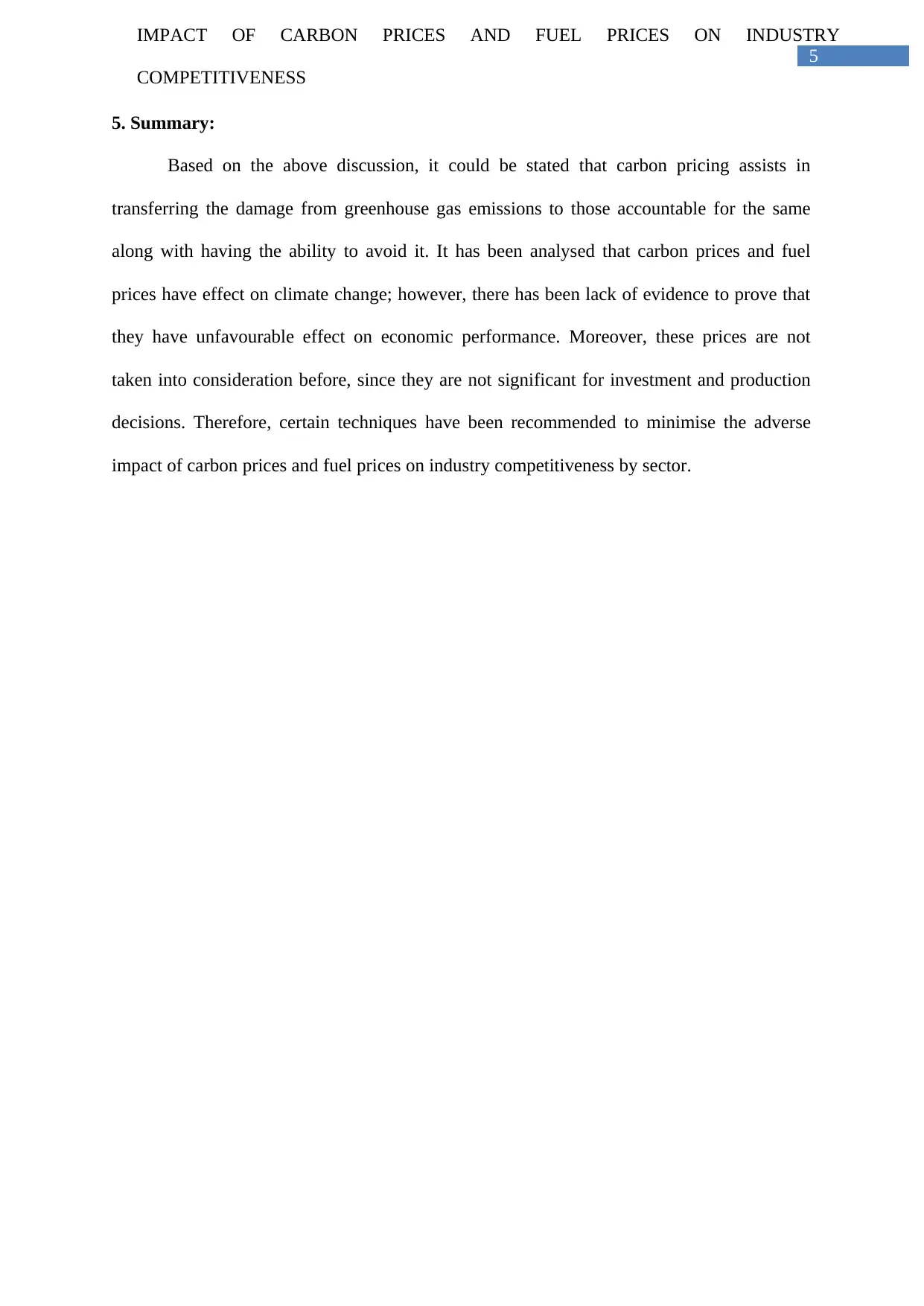
5
IMPACT OF CARBON PRICES AND FUEL PRICES ON INDUSTRY
COMPETITIVENESS
5. Summary:
Based on the above discussion, it could be stated that carbon pricing assists in
transferring the damage from greenhouse gas emissions to those accountable for the same
along with having the ability to avoid it. It has been analysed that carbon prices and fuel
prices have effect on climate change; however, there has been lack of evidence to prove that
they have unfavourable effect on economic performance. Moreover, these prices are not
taken into consideration before, since they are not significant for investment and production
decisions. Therefore, certain techniques have been recommended to minimise the adverse
impact of carbon prices and fuel prices on industry competitiveness by sector.
IMPACT OF CARBON PRICES AND FUEL PRICES ON INDUSTRY
COMPETITIVENESS
5. Summary:
Based on the above discussion, it could be stated that carbon pricing assists in
transferring the damage from greenhouse gas emissions to those accountable for the same
along with having the ability to avoid it. It has been analysed that carbon prices and fuel
prices have effect on climate change; however, there has been lack of evidence to prove that
they have unfavourable effect on economic performance. Moreover, these prices are not
taken into consideration before, since they are not significant for investment and production
decisions. Therefore, certain techniques have been recommended to minimise the adverse
impact of carbon prices and fuel prices on industry competitiveness by sector.
⊘ This is a preview!⊘
Do you want full access?
Subscribe today to unlock all pages.

Trusted by 1+ million students worldwide
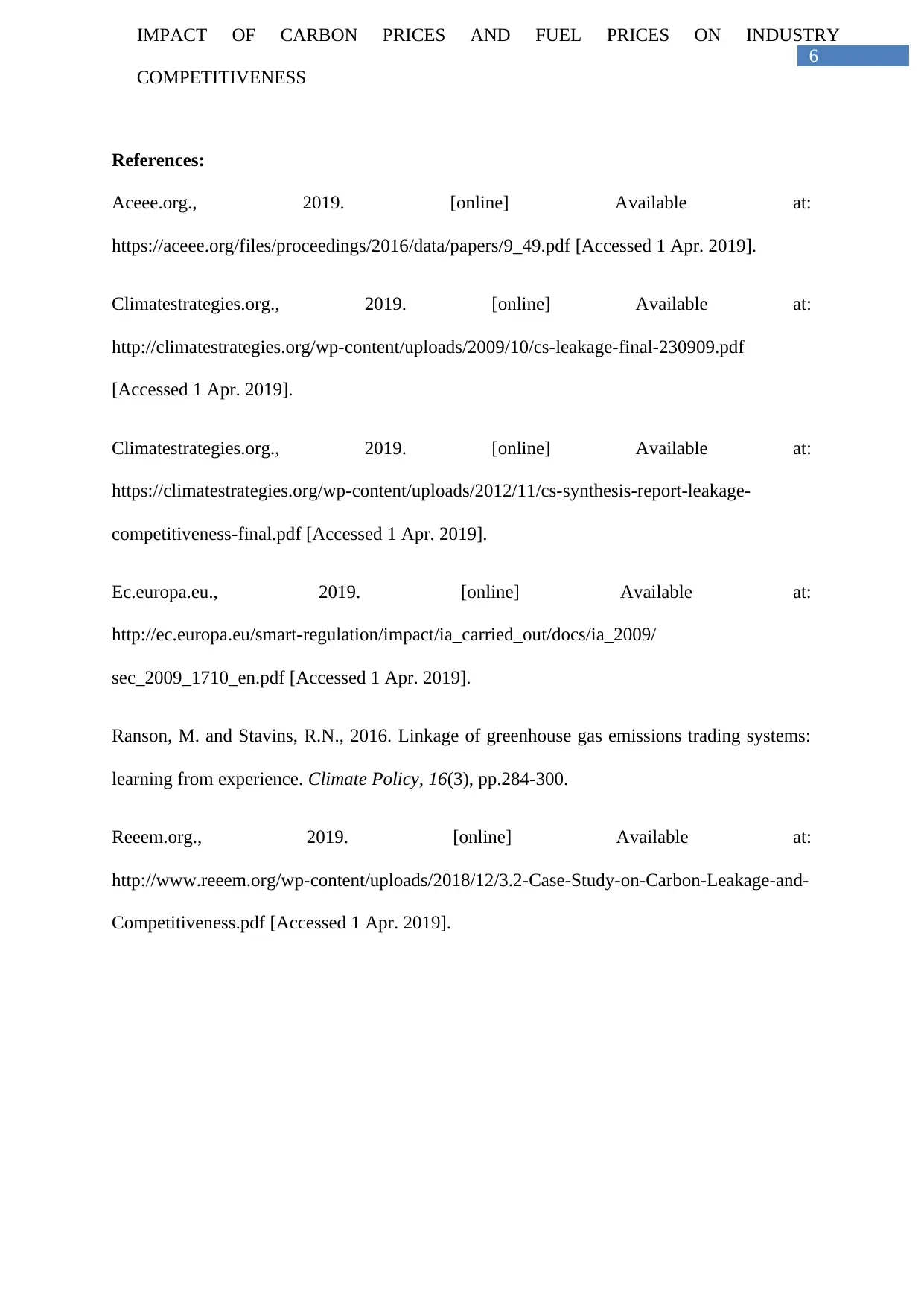
6
IMPACT OF CARBON PRICES AND FUEL PRICES ON INDUSTRY
COMPETITIVENESS
References:
Aceee.org., 2019. [online] Available at:
https://aceee.org/files/proceedings/2016/data/papers/9_49.pdf [Accessed 1 Apr. 2019].
Climatestrategies.org., 2019. [online] Available at:
http://climatestrategies.org/wp-content/uploads/2009/10/cs-leakage-final-230909.pdf
[Accessed 1 Apr. 2019].
Climatestrategies.org., 2019. [online] Available at:
https://climatestrategies.org/wp-content/uploads/2012/11/cs-synthesis-report-leakage-
competitiveness-final.pdf [Accessed 1 Apr. 2019].
Ec.europa.eu., 2019. [online] Available at:
http://ec.europa.eu/smart-regulation/impact/ia_carried_out/docs/ia_2009/
sec_2009_1710_en.pdf [Accessed 1 Apr. 2019].
Ranson, M. and Stavins, R.N., 2016. Linkage of greenhouse gas emissions trading systems:
learning from experience. Climate Policy, 16(3), pp.284-300.
Reeem.org., 2019. [online] Available at:
http://www.reeem.org/wp-content/uploads/2018/12/3.2-Case-Study-on-Carbon-Leakage-and-
Competitiveness.pdf [Accessed 1 Apr. 2019].
IMPACT OF CARBON PRICES AND FUEL PRICES ON INDUSTRY
COMPETITIVENESS
References:
Aceee.org., 2019. [online] Available at:
https://aceee.org/files/proceedings/2016/data/papers/9_49.pdf [Accessed 1 Apr. 2019].
Climatestrategies.org., 2019. [online] Available at:
http://climatestrategies.org/wp-content/uploads/2009/10/cs-leakage-final-230909.pdf
[Accessed 1 Apr. 2019].
Climatestrategies.org., 2019. [online] Available at:
https://climatestrategies.org/wp-content/uploads/2012/11/cs-synthesis-report-leakage-
competitiveness-final.pdf [Accessed 1 Apr. 2019].
Ec.europa.eu., 2019. [online] Available at:
http://ec.europa.eu/smart-regulation/impact/ia_carried_out/docs/ia_2009/
sec_2009_1710_en.pdf [Accessed 1 Apr. 2019].
Ranson, M. and Stavins, R.N., 2016. Linkage of greenhouse gas emissions trading systems:
learning from experience. Climate Policy, 16(3), pp.284-300.
Reeem.org., 2019. [online] Available at:
http://www.reeem.org/wp-content/uploads/2018/12/3.2-Case-Study-on-Carbon-Leakage-and-
Competitiveness.pdf [Accessed 1 Apr. 2019].
1 out of 7
Related Documents
Your All-in-One AI-Powered Toolkit for Academic Success.
+13062052269
info@desklib.com
Available 24*7 on WhatsApp / Email
![[object Object]](/_next/static/media/star-bottom.7253800d.svg)
Unlock your academic potential
Copyright © 2020–2026 A2Z Services. All Rights Reserved. Developed and managed by ZUCOL.




